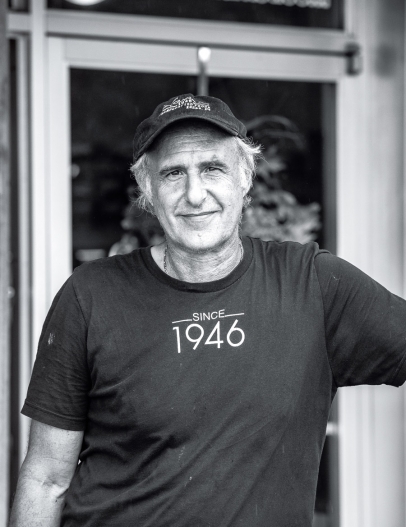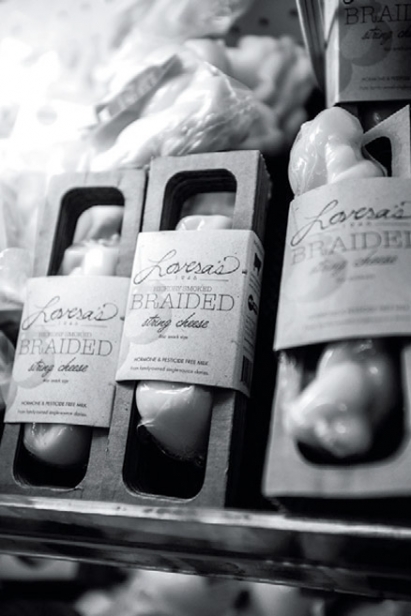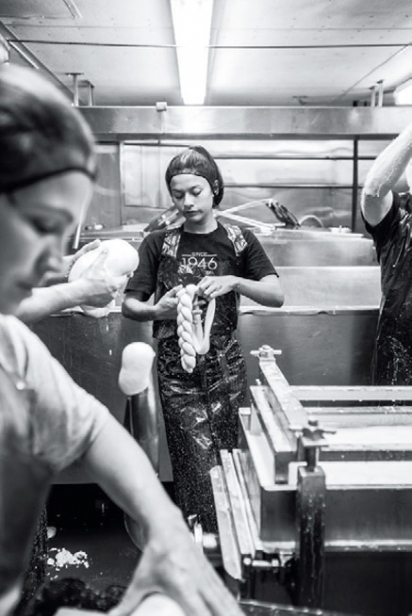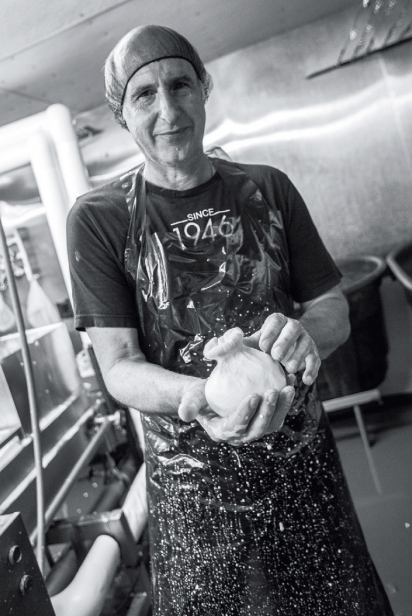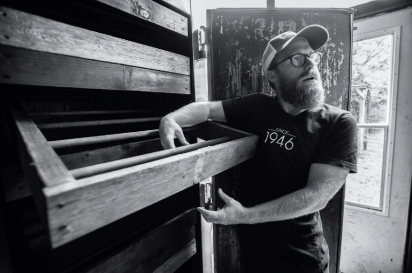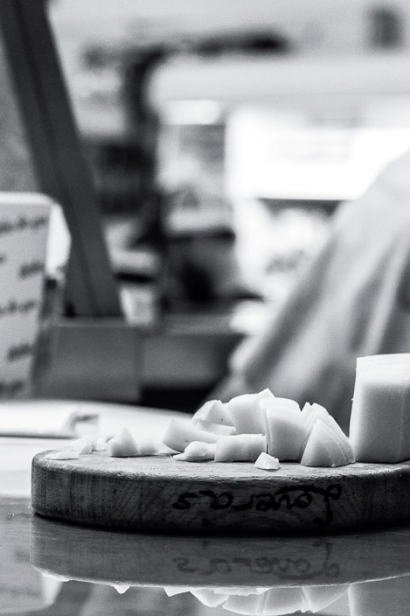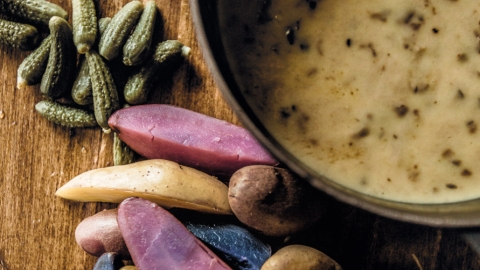Big Italy in Small-Town Oklahoma
“The early bird gets the worm, but the second mouse gets the cheese.”
—Willie Nelson
When one thinks of Krebs, Oklahoma, the words “Italian food” and “Choc beer” most likely come to mind. What doesn’t come to mind, typically, are the words “cheese capital of Oklahoma.” But after visiting Lovera’s, that is exactly what we think of the tiny enclave on the outskirts of McAlester.
It was a cold, rainy September day when we made the trek to Lovera’s Market in Krebs, but after seeing all that owner Sam Lovera is doing by way of cheesemaking, the chilled bones were worth it. We arrived in the morning during a much-needed rain shower, and made our way quickly to the cheese factory. The air outside smelled of snuffed-out hickory smoke from the previous day’s activities. Steamed-up windows only partially blocked the view of activity in the cheesemaking room: a half dozen workers in rubber boots, plastic aprons and hair nets were busy stretching, kneading and coaxing warm, rich and buttery curds into Lovera’s popular hand-formed gourd-shaped and braided caciocavera.
Sam Lovera stood among them—hairnet and all—stretching away. Steam rose from the open vat of warm, fresh Jersey milk delivered that morning. After braiding and shaping, the pieces were tossed with precision across the room into a vat of brine to rest, before being hung to dry in the temperature- and humidity-controlled aging room.
To understand why Sam Lovera stands among the cheesemakers, and why his heart is rooted in Italian ingredients, we have to backtrack to the early 1900s, when Italian immigrants (including Sam’s family) came to the area to set up a coal mine. The Italian enclave of around 2,500 people developed from there with Italian-American restaurants and the best—if not only—authentic Italian market in the state.
Lovera’s grocery and market has been around since 1946 when Sam’s grandmother Martha opened a meat market and community grocery store to service the area, as well as to make ends meet after her husband, Battista, was killed in a mining explosion. Martha’s son, Mike, and his wife, Madeline—Sam’s parents—took over the business and opened what is now Lovera’s. To say the market has always been a part of Sam’s life would be an understatement: He was raised above the store, and his mom still owns the house next door to the market.
“We have been making Lovera’s Italian sausage since day one,” says Sam Lovera. “Then Walmart came to town and we had to find ways to diversify the business.” Lovera’s many products, including that sausage and their popular caciocavera cheese, became a brand, sold throughout the country via mail-order. Lovera’s branded products can be found in many grocery stores and specialty markets in the Tulsa area and around the state.
The market’s shelves are also lined with high-quality imported Italian ingredients and products, many of which are hard to find outside of “the boot.” But, being a person who once sold over 300 kinds of cheese, I think that what Lovera’s market should be bragging about are the dozen or more varieties of artisanal cheeses coming in through the back door on a daily basis.
Shawn Duffy, Sam’s son-in-law, joined the family business back in 2008 and, thanks in part to his culinary experience and scientific background, kick-started the artisanal cheese production and is now head cheesemaker.
“The only milk used to make Lovera’s cheese is from Jersey cows that graze happily at the Yoder family dairy down the road in Clarita, Oklahoma,” Duffy said. “We receive the milk in the morning, and fresh-made cheese is in the cooler by afternoon.”
All of Lovera’s cheeses are made with an open-vat system. “Every piece is hand-cut and hand-stretched,” Duffy said. “Our cheesemaking facility currently produces 60,000 pounds of cheese a year, but we hope to get that up to 120,000 pounds annually.”
Matteo Lovera, Sam’s grandson, is now the market’s official cheese apprentice. He manages the cave program as well as all charcuterie. He spent time studying cheesemaking in Northern Italy—the Loveras hail from the Piedmont (Piemonte), one of the best cheesemaking regions of Italy—you’ve heard of Robiola and Gorgonzola, no?
With the exception of the Loveras, however, Krebs expats came mostly from southern Italy, so the facility mostly makes cheese from that region, including the flagship caciocavello-style Caciocavera (the name is a cross between the DOC-protected caciocavello and the Lovera family name).
In 2012, on a whim, Duffy attended the American Cheese Society conference in Raleigh, entering the smoked caciocavera in the competition. He brought home a highly coveted second-place award; it was to be the first of many awards. In 2013, Duffy custombuilt a smoker from an old refrigerator unit, which is currently used exclusively for smoking cheese. The aged wheels and fresh balls rest or hang on custom-made shelves. Duffy’s cheeses have been bringing home the accolades ever since.
In 2013, Lovera and company took over a cheese processing plant in Ada, which now produces exclusively Toma and Gorgonzola, as well as other blue cheeses, keeping true to their Piemontese roots.
That same year, a cheese “cave” was added to the mix, which mimics the environment of an actual cave, where cheeses have been aged for centuries. Duffy is able to control humidity and temperature, helping to produce some of the best cheese to ever come from our state—including the Oklahoma Toma, a smooth yet semi-hard wheel reminiscent of the alpine cheeses of the Piemontese region of the Italian Alps.
A cheese drying room and warehouse was added in 2017.
Local grocers take note: With the exception of a small assortment at The Goods Bodega downtown, most of these cheeses are not available in the Tulsa market, but they should be! All varieties are available online at loverasmarket.com.
Here’s a sampling of Lovera’s specialty cheeses:
Oklahoma Toma
Toma cheese originated in the Piemontese region of northern Italy, and brings to life the flavors of the rolling pastures of Lovera’s dairy partner, Peaceful Valley Farm. Allowed to age on wooden planks for five months, Oklahoma Toma has a smooth yet semi-hard texture, and a buttery full flavor.
Black Hat Toma
This rustic Alpine-style cheese is made from raw goat milk. Aged on cedar planks for a minimum of three months, this natural-rind cheese is mild and nutty with a peppery, earthy finish. Working closely with their two goat dairy partners Lovera’s utilizes the very highest quality fresh milk possible. Black Hat Toma is named in honor of friend Hershel Williams, who has worked tirelessly to promote Oklahoma goat dairying, and who likes to wear his 10-gallon black felt cowboy hat as often as possible. Black Hat Toma is also available with caraway seeds, coriander seeds or black peppercorns, or with 100% sheep milk.
Hand-formed or braided Caciocavera (fresh, aged, smoked, herb, diavolo and batista)
Lovera’s flagship cheese, a rich and buttery cross between mozzarella and provolone, has won many awards, including a first place win at the 2012 World Cheese Awards.
Bleu Thunder
Inspired by the Oklahoma City Thunder basketball team, this rustic blue and orange gorgonzola is made from raw Jersey cow milk, giving it a buttery flavor and creamy texture. Annato seed gives this cheese (as well as many other orange-hued cheeses) its color.
Desertetto Blua
Gorgonzola is an ancient blue cheese that originated in the mountainous Piedmont region of Northern Italy. Desertetto Blua is named in honor of Sam Lovera’s grandmother Marta Blua, who resided in the small village of Desertetto by Valdieri in Piedmont. Lovera’s follows the traditional double-curd technique of Gorgonzola production: using two different days’ curds to produce a cheese that is both crumbly and smooth. Using raw Jersey cow milk rich in cream along with remote strains of Penicillium roqueforti they have crafted a uniquely exquisite blue.
Incarnation Black Hat Toma
One of the several cheeses made with craft beer, in this case 4 Hands Incarnation IPA. Each batch of this raw goat-milk cheese has a healthy dose of Mosaic hops dusted over the freshly drained curd. To help bring to life the fruity notes of the beer, freshly cut flecks of organic dried mango are added. Each wheel is hand hooped and then pressed, salt-brined and allowed a 48-hour soak in this legendary IPA before aging for just over 60 days.


